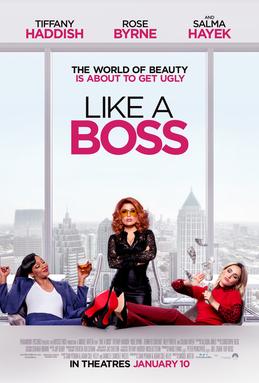From the moment the film begins, it’s clear this is going to be a fast-paced, colorful, and comical ride. Directed by Miguel Arteta, Like a Boss stars Tiffany Haddish and Rose Byrne as lifelong friends who run a small but struggling beauty company. Set in modern-day Atlanta, the film revolves around the cosmetics industry, blending comedy with light-hearted drama in the genre of buddy comedies. The vibrant setting reflects the glamorous and cutthroat nature of the beauty business, and it’s this backdrop that provides the perfect stage for a story about friendship, ambition, and resilience.
At its core, the story follows Mel (played by Rose) and Mia (played by Tiffany), two best friends who have built a small cosmetics company from the ground up. While Mia is the creative and spontaneous half of the duo, Mel is the pragmatic one, trying to keep their business afloat amidst financial difficulties. When their company falls into debt, they are approached by Claire Luna (played by Salma Hayek), a beauty mogul with ulterior motives. Claire offers to invest in their business, but her manipulative tactics soon threaten to tear Mel and Mia apart. As the two women face the pressures of keeping their company alive, they must also confront the challenges of their friendship and their different visions for the future.
One of the standout elements of the film is the chemistry between Tiffany and Rose. Their performances carry the movie, and their comedic timing is impeccable. Tiffany, known for her sharp wit and charismatic presence, brings her signature energy to Mia’s role, making her a relatable character full of charm and quirks. Rose, on the other hand, plays the more grounded Mel with just the right amount of vulnerability, perfectly complementing Tiffany’s exuberance. The duo’s friendship feels genuine, and it’s their banter and emotional exchanges that keep the audience engaged throughout the film. Even in moments of tension, the film never loses its lighthearted tone, thanks to the strength of their performances.
On the direction front, Miguel Arteta keeps things breezy, never allowing the film to take itself too seriously. The pacing is brisk, with most scenes moving swiftly from one comedic scenario to the next. While this works well for the humor, it sometimes leaves emotional moments feeling a bit rushed. The film doesn’t dig too deeply into the complexities of running a business or the strain on their friendship, opting instead for more superficial conflicts. However, this light touch works within the context of a comedy that’s designed more for laughs than introspection. The direction keeps the film visually appealing as well, with a colorful aesthetic that reflects the beauty industry the characters are involved in. The makeup, fashion, and set designs all add to the film’s overall playful tone.
The music in the film, composed by Christophe Beck, fits well with the upbeat and energetic vibe. The soundtrack features a mix of contemporary pop hits, which injects energy into various scenes, particularly during montages that showcase the duo’s business efforts or their wild nights out. It’s not a score that stands out in a groundbreaking way, but it complements the tone of the movie and adds to the feel-good atmosphere.
The cinematography by Jas Shelton does a good job of capturing the vibrancy of the beauty world. The colors are bright and pop off the screen, especially during the scenes in the cosmetic offices and stores. The film also uses light in a way that contrasts the polished, superficial world of Claire Luna and the more down-to-earth, gritty world of Mel and Mia’s small business. However, the cinematography never becomes a focal point in itself; it serves its purpose in supporting the story but doesn’t push any boundaries in terms of visual innovation.
Another noteworthy element is the costume design, which plays a key role in defining the characters and the world they inhabit. Claire Luna’s extravagant and over-the-top outfits, designed to emphasize her ruthless, larger-than-life personality, are a stark contrast to Mel and Mia’s more relatable, practical fashion choices. These wardrobe choices subtly reinforce the power dynamics at play in the story. Claire’s luxurious style represents her corporate dominance, while Mia and Mel’s simpler outfits reflect their struggle to stay true to their roots and maintain their identity in a competitive industry.
However, while the performances and aesthetic are commendable, the plot itself can feel a bit formulaic. The narrative follows a predictable path, with the central conflict—friends torn apart by business pressures—feeling overly familiar. The antagonistic figure of Claire Luna is entertaining, largely due to Salma’s exaggerated performance, but the character remains one-dimensional. The movie touches on themes of ambition, loyalty, and personal growth, but doesn’t fully develop them, opting instead for quick resolutions and comedic payoff. This works for a casual viewing experience, but it doesn’t leave a lasting impact.
Where the film truly shines, though, is in its depiction of female friendships. While many films in the comedy genre pit women against each other, Like a Boss celebrates the strength and resilience of women supporting one another. Mel and Mia’s relationship is the heart of the movie, and despite their differences, it’s clear that their bond is unbreakable. This message is refreshing and uplifting, especially in a genre that often relies on shallow portrayals of female characters.
In conclusion, Like a Boss is an entertaining, feel-good comedy that succeeds largely due to the chemistry between its two leads. While the plot is somewhat predictable and the character development could have been deeper, the film delivers on laughs and provides a fun, light-hearted experience. If you’re looking for a movie that doesn’t take itself too seriously and celebrates the power of friendship, this is a solid choice. The performances of Tiffany and Rose alone make it worth the watch, and it’s the kind of film that’s perfect for a casual night in with friends. Just don’t expect it to break new ground in terms of storytelling or thematic depth.







